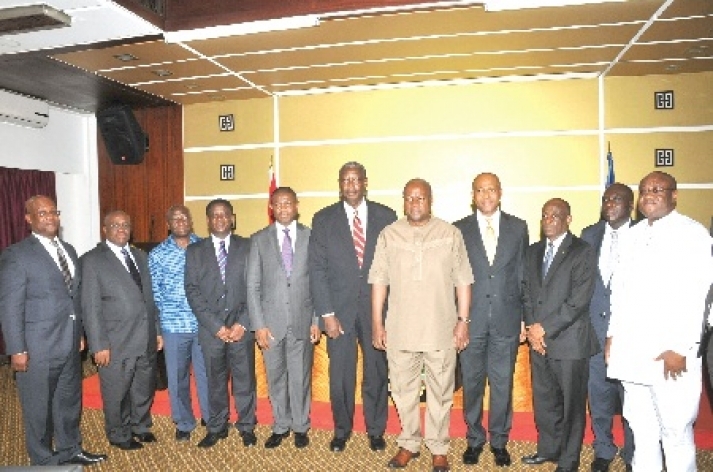
President John Dramani Mahama yesterday inaugurated two bodies at the Flagstaff House to bolster the infrastructure and export financing sectors of the economy.
The first was the Ghana Infrastructure Investment Fund (GIIF) Board, followed by the Presidential Task Force on the establishment of the Ghana Exim Bank.
The nine-member GIIF Board, chaired by Mr Ato Ahwoi, will lead the GIIF to achieve its objective of mobilising financial resources to manage, co-ordinate and invest in a diversified portfolio of infrastructure projects in the country.
Membership
Other members of the GIIF Board are Mr Steve Nartey, the acting Chief Executive of the fund; Mr Lionel Van Lare Dosoo, a former Deputy Governor of the Bank of Ghana; Mr Phillip Sowah, an engineer and former CEO of Airtel Ghana; Madam Clara Arthur, an IT business specialist, and Nana Afoa Appiah-Korang, the Director of Engineering, Central Partners, Nigeria.
The others are Mr David Ofosu Dorte, a legal practitioner; Mrs Kate Quartey-Papafio, CEO of Reroy Cables, and Mr Clifford Mpare, the Executive Chairman and CEO, Frontline Advisors.
In line with the provisions of the GIIF Act of 2014, the President also appointed five persons to an Advisory Committee for the fund.
They are the Minister of Finance, Mr Seth Terkper; the Governor of the Bank of Ghana, Dr Henry K.A. Wampah; the acting Director-General of the National Development Planning Commission, Dr Nii Moi Thompson; the President of the Association of Ghana Industries, Mr James Asare-Agyei, and Phyllis Christian of Shawbell Consulting.
Background
President Mahama had promised in 2014 to establish the fund to deal with the huge annual infrastructure deficit of $1.5 billion, as well as focus on strategic projects that would lead to job creation.
The government followed it up with a bill to Parliament, which was eventually passed into law in July last year.
Consequently, the President appointed the board of directors to steer the affairs of the fund.
Pace of development
President Mahama said anyone who travelled across the country would appreciate the fast pace at which the country was developing.
“There are many critical projects in roads, education, health, ICT, among other projects, that are being developed. All the projects are necessary to position Ghana as a country ready to leapfrog and contribute to the needed transformation and diversification of the economy,” he said.
He, however, pointed out that all the development hinged on funds, for which the GIIF was expected to serve as the vehicle to reach the set goal.
Long-term financing
One of the drawbacks of infrastructure development in the county is the lack of long-term financing.
President Mahama stated that funding that the government was able to get came along with sovereign guarantees and once the guarantees were issued, the debts were lumped into the public debt.
The GIIF, the President said, would, therefore, provide a long-term financing arm for infrastructure development, as happened in other countries.
It would also be a vehicle for implementing a more sustainable debt management strategy.
Finance Minister
Mr Terkper said support from the World Bank and the African Development Bank was on its way.
Besides, there were indications from the Italian Credit Agency, as well as Korea and other places, to help the fund, he said.
Mr Ahwoi promised that the team would live up to expectation, adding that one of its immediate areas of importance was electricity.
Exim bank
The 14-member board on the establishment of the Ghana Exim Bank has Mr Lionel Van Lare Dosoo, a former Deputy Governor of the Bank of Ghana, as Chairman.
The task force is tasked with the responsibility put together the framework establishing an Exim bank in Ghana.
As a quasi-governmental institution, the Exim bank will act as an intermediary between the government and exporters for export financing.
Over the years, the government has supported importers and exporters through many initiatives, but the President said the key role of Exim banks as drivers for the export of strategic goods and services and overseas investment by Ghanaian companies was unavailable.
President Mahama said he did not want Ghana to remain an import-dependent country.
Source: Graphic


